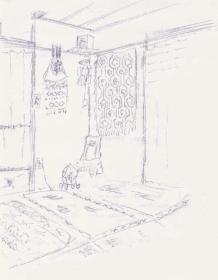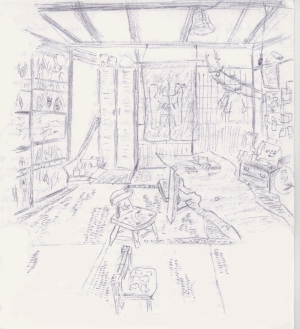A Tale of Two Families
During our last few days in Aomori we
were invited to dinners by two women from the church. Both are
devoted disciples of Christ, both are active evangelists in their
own way, both have Christian sons and unbelieving husbands, yet the
differences between their families was striking. I have, no doubt,
witnessed similar contrasts and had opportunity to observe the truths of
Solomon’s proverbs here in the U.S., but never before have those truths
been able to surprise me like they did at the two homes in Japan, where
I was not expecting them.
| “The fear of the
Lord leads to life: then one rests content untouched by trouble.” Proverbs 15:33 |
Her husband is an up-and-coming salaryman at an insurance company, so he was unable to attend, since he had to go drinking with his co-workers every day, returning late. I was impressed with the first-hand reality of Japanese marraiges, where the husband provides very well for his family yet is largely absent from his family’s life. How much love can be shared when the husband comes back after a late round of drinking? Until then I doubt that I truly believed that empty marraiges were the norm, as even in decline the American expectation is that the husband spends time with the wife and family. (In America, though, failure to meet that expectation results in divorced families, in which the husband is equally absent) As a bachelor aspiring to be married and no longer alone, the sadness of a lonely marraige is especially poignant.
She did not say how she viewed her marraige; the only mention of her husband that evening was that he had promised that he would divorce her if she does not offer incense to his parents at their death. Having been told of the difficulty for a single woman to support herself in Japan, this would worry me. Yet she lives her life seeking the good of others and seeks to bring others to know God, even to the point of attending English classes, initially without any desire to learn English, so that a friend would have an opportunity to see God through Mrs. Ghent’s teaching. In everything we saw her do, wherever she was, she was there with a smile.
 |
 |
| Better a meal of
vegetables where there is love than a fattened calf with[out it] Proverbs 15:17 |
Since the wife and husband are both (well-respected) potters, their work keeps them naturally together, and we had a pleasant meal, which in true male fashion the husband cooked the meat outside in a sort of barbecue oven, together with their son. Although here was no upper-middle class comfort, it was obvious that they loved each other. It would have been no surprise, for it was what I expected, had this not been the second meal. Having seen the emptiness of wealth, I would definitely choose the second life-style. Doing what you love, with the person you love; the only thing that would be better is for your spouse to love God, too. Still, the first evening was evidence that God is truly all we really need to be content.